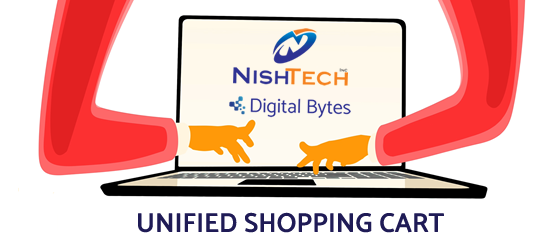7 Tips for Effective Ecommerce SEO
written by Nishtech
|August 2022
Whether you’re looking to make some additional revenue, support channel partner sales, or start offering your product or service directly to customers and consumers, creating an ecommerce site can be a low-cost way to start selling your products.
Ecommerce websites should provide consumers with a digital shopping experience that makes it easy to find the products they want. Convenience and ease of use should be the goal, and that means understanding the customers that want and need your product and showing up when they perform an online search for your product or service.

If you operate an ecommerce website, you’ve probably heard of search engine optimization (SEO). Understanding how to use SEO to rank your site above the competition can take your business-to-business ecommerce site from a side hustle to your primary source of income. Learning effective SEO strategies for ecommerce is a good way to start attracting more customers.
What is Ecommerce SEO?
Brick and mortar shops can use interesting architecture and interior designs to attract customers. Successful retail stores use these physical traits to convey styles and personalities that attract shoppers to their location.
If you’re overwhelmed by the concept of SEO or don’t understand how it can help you reach more customers, it can be helpful to think of SEO as your digital storefront, or the directory and roadmap to find you.
Just like how shoppers might stop by a store that looks attractive from the outside, digital consumers can be directed to your e-commerce site through SEO. SEO is simply a set of strategies and best practices that help people find you, let them know more about you and your business, and get more people looking at your page.
Why is Ecommerce SEO Important?
Once you understand what ecommerce SEO is, it’s easy to see how it’s a critical concept for anyone looking to succeed in the online marketplace. Modern consumers like to do their own research before buying a product and are wary of advertisements meant to capture their attention.
The best SEO strategies produce content that helps consumers come to a buying decision. Rather than paying for a product ad, you can create helpful content that informs consumers and allows them to better understand what they’re looking for. A comprehensive SEO strategy helps you become an ally to consumers rather than an adversary, and best of all, it’s free.
Tips for Business-to-Business Ecommerce SEO
If you want to take your ecommerce business to the next level, you’ll need an arsenal of SEO tools and strategies to help you succeed. Here are 7 tips that can improve your site’s ranking and visibility:
- Learn How to Perform Keyword Research
One of the first steps in creating your SEO strategy is to perform keyword research. Keyword research is the process of learning about what people are typing into the search engine when looking for products like yours.
While some keywords can be obvious, understanding what problem your product solves can help you reach audiences that may be neglected by your competitors. To start learning about the right keywords to include on your page, it’s a good idea to work with a program that gives you keyword insights like Google Analytics or Semrush.
- Research Your Competitors
In addition to understanding what your target audience is looking for, learning about how your competitors position their page can help you improve your ranking. Once you know what your target audience is searching for in Google, you can perform the same search and see what results show up.
After searching, look at the websites that show up on the first page. How are they designed? What is their layout like? What page does the result link to? Researching the top-ranking results can give you inspiration for your own site. It also ensures your website is addressing the key needs of your target audience and meeting their expectations.
- Streamline Your Website Structure
The structure of your website can affect its visibility on the search engine results page (SERP). Well-designed sites contain pages that link to each other. When creating your ecommerce store, you should try to keep each page just a few clicks away from one another. Linking your pages closely together can help increase the authority of your homepage, which is an important SEO metric for getting your e-commerce site on the SERP.
- Focus on Ranking Your Product Pages
If a customer is at the end of their buyer’s journey and looking for a specific product, they don’t want to find links to your homepage or blog. When a user searches for a phrase like “buy a mahogany coffee table,” they want to find product pages with specific product information and pricing, not a blog comparing coffee and dining tables.
Focusing on ranking your product pages, with pages and content designed to ease the buying process and close out the sale, can help you capture traffic from consumers who are close to making a buying decision. Ranking your product pages is one of the best ways to increase your sales volume and start serving more people.
- Create Content That Targets Your Audience
If someone is ready to buy and just wants to look at a few options before deciding, then linking to your product page is a great strategy. However, you don’t want to neglect buyers who are at a different phase in their journey.
In addition to improving the ranking of your product pages, you should create content that addresses the other keywords your audience is searching for. Depending on the type of product you sell, you may want to create blogs that discuss the pros and cons of different designs. You could also write a guide that discusses a few ways that your product could be used or produce a video that demonstrates how the product looks in differently styled rooms.
When creating this type of content, it’s important to focus on helping the buyer and their needs, rather than your product or service and constantly pushing the sale.
- Work With a Content Management System
After creating a variety of content, it can be hard to track how different types are performing. To get the best results, it’s important to stay organized.
Working with content management system software helps you maintain your site’s optimized structure while also streamlining your creation process. A content management system platform makes it easy to write, produce and design different content styles and to get them live on your site quickly.
- Track Your Success and Keep Improving
While it feels great to start seeing results, it means you are just getting started. SEO strategies are constantly changing, so to stay on top of the results page, you need to be able to adapt. To stay successful, it’s important to monitor your website’s performance and stay up to date with the latest SEO trends.
By keeping your finger on the pulse, you’re able to maintain your ranking and keep serving your customers. If you remain committed to providing the best experience for your shoppers, you’ll be able to enjoy continual success.
Nishtech Can Help
If you’re frustrated by your site’s performance, or haven’t seen the results that you need, Nishtech can work with you on a solution. Our experts can provide you with a content management platform that supports and enhances your business-to-business ecommerce site, making it easy to get the right content on your site and support your sales goals.
Working with us gives you access to not only experts in ecommerce, but SEO professionals who understand how to identify keywords, create content, and find your target audience. If you want to take your ecommerce site to the next level, contact us today.



